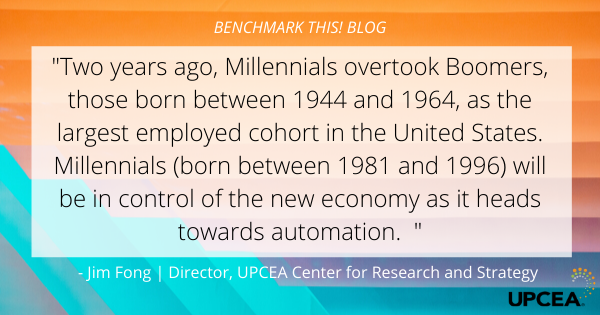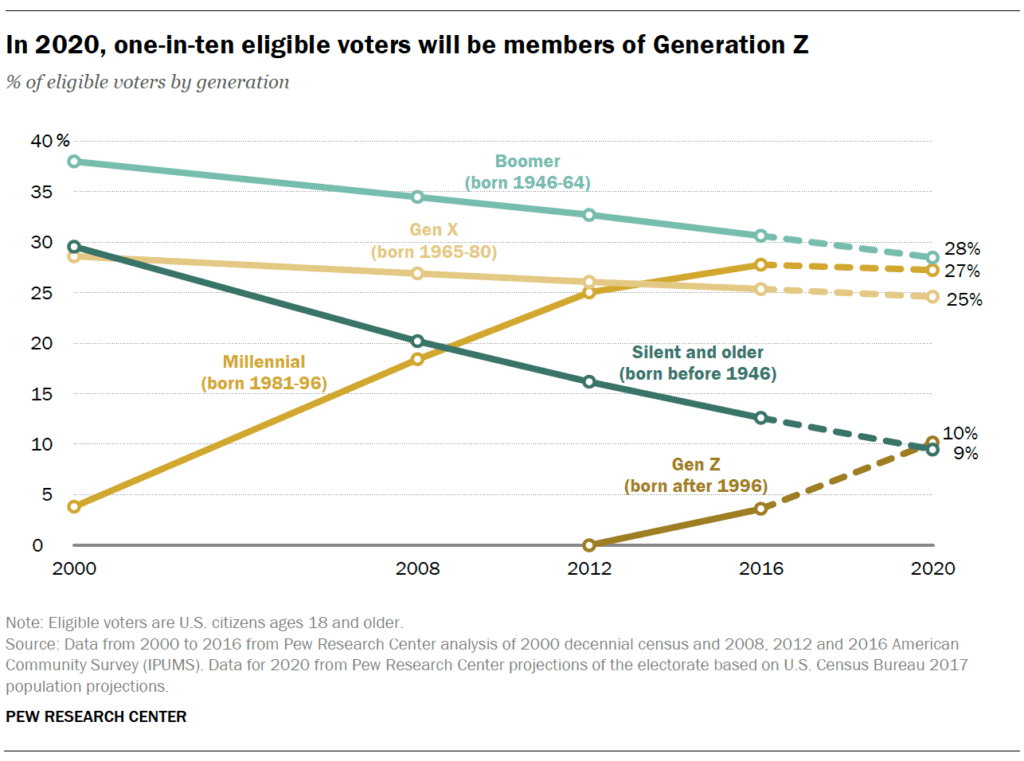OK Boomer … Move Over for the Millennials in the New Economy
In early November 2019, Chlöe Swarbrick, a 25-year-old politician from New Zealand responded to an older lawmaker who interrupted her with “OK boomer,” as she spoke on climate change. The response, while perceived as innocent but snarky, was a critical signal regarding a future economic and political struggle on the horizon, as well as an intergenerational war. Shortly after the comment, AARP executive Myrna Blyth responded “OK, Millennials, but we’re the people that actually have the money.” This response, unknowing to Ms. Blyth, became a rallying cry for many angry and frustrated Millennials worldwide. Twitter and other social media channels exploded with angry Millennials expressing antipathy towards the Boomer generation and their arrogance and greed, leaving Millennials with college debt, personal debt and lower wages.

Four years ago I had my epiphany that Millennials, those born between 1981 and 1996, had it right and that they would be in control of the new economy as it heads towards automation. Two years ago, Millennials overtook Boomers, those born between 1944 and 1964, as the largest employed cohort in the United States. While Blyth was technically correct, Millennials had the numbers, but had not reached the boiling point of economic frustration … until now. Swarbrick’s remark followed by Blyth’s retort is the point where the pendulum begins swinging in the other direction in the new economy.
As the economy becomes more automated, data-driven, technology-dependent and increasingly complex, Boomers will start disengaging from day-to-day decision-making and sliding into retirement. The economy will change and has shown signs of it:
- Over 1.3 million drones are registered with the FAA. (Reuters, February 2019)
- There were over 38.5 million rides on electric rideshare scooters and 36.5 million rides on rideshare bikes in the U.S. during 2018. (National Association of City Transportation Officials, 4/17/19)
- eSports global revenues topped $1.1 billion in 2019. (Reuters, 2/12/2019)
- According to the IMARC Group, the cannabis market was worth $10.1 billion in North America in 2018 and is expected to be valued at $43 billion by 2024. (Financial Buzz, 11/1/2019)
- The plant-based protein market, which includes veggie burgers and other meat-substitute products, is expected to be valued at $12.1 billion worldwide in 2019. (Statistica, 10/25/2019). These products can be found at major restaurant and fast food chains including Dunkin Donuts, Burger King, Qdoba, Tim Horton’s and TGI Fridays.
The list above is NOT what we call Boomer products and services. While Boomers work within the plant-based protein, drone and cannabis markets, are they ready and willing to lead the industries and their respective companies into the next decade? Doubtful. They’ll be bystanders and tertiary consumers, and not necessarily leaders and influencers en masse.
With massive industrial and economic changes on the horizon, the workforce will dramatically change. Boomers will retire at the rate of 10,000 a day or roughly between 3.5 and 4 million annually. By 2025, about 16 million more Boomers will retire, totaling 49 million in retirement and leaving roughly 20 million in the workforce, not including about a million Boomers dying annually during this time period.

Figure 1 – Generational Voters
The rise of the Millennial will be determined by a number of major milestones:
- The rate of adoption of 5G and high-speed satellite communications (such as Elon Musk’s Starlink). While there is a great deal of hype around 5G, early tests show that it will deliver data and information at rates 10-100 times faster than current high-speed internet. This, like the adoption of smartphones to the current mobile or cloud economy, will be the backbone needed for the automation economy. Once the automation economy hits high gear, technologies will begin proliferating again, further alienating and dispersing Boomer power.
- The 2020 election and the role of Generation Z. The tragedy of the Parkland shooting and the rallying around the #MeToo movement has shown that Generation Z and young Millennials have a voice. Most recently, the cohort showed how loud its voice can be through the youth climate strike and Greta Thunberg. Previously passive Millennials finally exerted political power showing up for the 2018 midterm elections. If Millennials and Generation Z significantly influence the 2020 United States presidential election, it will empower the generations in so many other ways, including reshaping healthcare and fixing higher education. In 2016, Generation Z represented just 4% of eligible voters. In 2020, they will represent 10% of those eligible. Boomers, while showing a high participation rate at the polling booths, will decline from 31% to 28% of eligible voters. The outcome of the 2020 election may hinge on generational voting participation and party preferences, as Millennials and Generation Z are favoring or leaning Democrat (62% according to the Pew Research Center) while Boomers are split down the middle.
- Allies of Generation Z (those born between 1996 and 2010) and the passive leadership of Generation X. Generation Z, while unique in many ways to Millennials, share similar technological abilities, financial struggles, work-life beliefs, communication styles and tools, a desire for transparency and global concerns. They are very likely to align with Millennials, potentially overpowering or at least influencing the C-suite cohort in 2025, Generation X (those born between 1965 and 1980). By 2025, Generation Z and Millennials could combine to be almost two-thirds of the workforce, overpowering Gen X’ers and Boomers by 100 million to 56 million. Generation X will resist and Boomers will complain, but Gen Z and Millennials will have the numbers and influence (i.e., crowdsourcing) to accelerate change.
Flash forward to 2025. Computing is more powerful. Digital communication is almost real-time. The transportation infrastructure is changing. Between one-quarter to a third of Boomers will be in the workforce, a far-less powerful foe for economic change. Millennials will seek to balance their economic woes, potentially moving wealth from the Boomer-rich to the open markets through higher product or service costs that the wealthy Boomer consumes or through taxes and other financial mechanisms.
Flash forward to 2030. The automation economy will be accelerating, but not in full gear. Data will transmit back and forth. More traffic signals will be sensor-driven. We will be at the beginning of the automated vehicle era. Our homes will be much smarter. Consumer behavior will be better predicted. Physical currency will no longer exist. More workers will be working from home offices and not be fully bound to a 9-to-5 schedule. Displaced retail workers will be absorbed by our new economy’s technological enhancements as well as an aging population and the support it will require.
What will become of higher education? The traditions of higher education will be replaced by the functionalities and intersections of the new economy. Many college degrees that are in alignment with the new economy will continue to flourish while new degrees, many of which may not exist today, will be approved faster than by the current processes and committees of today. These new degrees will have more influence from employers and will be guided by information such as competency data, assessments and outcome data. Predictive analytics may also play a greater role in the creation of education products and credentials. Analytics may also prove that 120 credit hours doesn’t define or guarantee competency and the credential.
New credentials will be important for jobs with quickly changing requirements and will be accepted and respected more broadly by employers and their Millennial managers and leaders. Students will still come to campus, but in smaller numbers and learn in different ways, including the use of virtual reality, online and new technologies. For many courses, an instructor may not even be present, being replaced by technology. Students might also participate remotely but synchronously. As a result of change, the industry of higher education is likely to constrict based on many colleges and universities unable to adapt to the demands of the new economy. Many higher education employees will likely shift into the development, delivery and support of education.
By 2030, the U.S. will have gone through three presidential elections and be gearing up for a fourth in 2032. Greta Thunberg will be an active 27-year-old and no longer dismissed as a child by change-resistant Boomers, the majority of whom will be in their 70s and 80s. There will be about 150,000 centenarians (those 100 years of age or older) in the U.S. Learning and education will likely look very different for the 18-to-22-year-old full-time, campus-based student and others entering, upskilling or reskilling for the new economy.
Jim Fong is the Chief Research Officer for UPCEA and is a passive, yet data-driven Gen X’er.
Learn more about UPCEA's expert consultants.
Do you need help with your PCO unit or campus? We can help. Contact UPCEA Research and Consulting for a brief consult. Email [email protected] or call us at 202-659-3130.
Trusted by the nation's top colleges and universities, UPCEA Research and Consulting provides the best value in the industry today. UPCEA's industry experts have years of experience in Online and Professional Continuing education - put them to work for you!
UPCEA Research and Consulting offers a variety of custom research and consulting options through an outcomes-focused pricing model. Find the option(s) that best suit your institution.
Learn more about UPCEA Research & Consulting
The UPCEA Difference
Unmatched Experience: For more than 100 years, UPCEA consultants have exclusively served the needs of online and professional continuing education programs. UPCEA consultants leverage their extensive industry expertise to expedite solutions, anticipate upcoming shifts, and offer distinct best practices, effectively aiding clients in achieving their goals.
Cost Effectiveness: As a nonprofit, member-serving organization, we provide unmatched value, allowing you to maximize limited research and consulting budgets.
Action in Motion: Our cadre of experienced, skilled authorities and expert practitioners propels you forward, translating research and consulting into impactful implementation, a distinctive hallmark of UPCEA. Our team of current and former institutional leaders will support you, turning research and consulting into action.
Mission Alignment: Like you, our mission is to enhance and expand educational opportunities and outcomes for adult and other non-traditional learners. We share your values and work in partnership with you to advance access and excellence in education.
